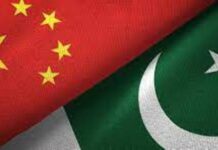BEIJING: The world features different types of democracy, with the concept rooted in the history, tradition and culture of each country. But how can we evaluate whether a country’s political system is, in fact, democratic?
Democracy must give people the opportunity to participate in the process of their country’s development. It must be effective and change people’s lives for the better. Also, the people should be the judges of their own political systems.
Whole-process people’s democracy is a socialist form of democracy developed by and in China. It is a holistic and systemic concept. It is not only a procedural concept but also a substantive one. It is not only about the right to vote, but also about the right to participate.
The annual Two Sessions are the most important political gatherings in China. The term “Two Sessions” refers to the annual meetings of the National People’s Congress (NPC), China’s top legislature, and the National Committee of the Chinese People’s Political Consultative Conference (CPPCC), the country’s top political advisory body. Both bodies have distinct but fundamental roles in China’s political life. Usually set in March, the sessions gather NPC deputies and CPPCC National Committee members from across the country to discuss and approve national priorities.
People’s congresses and CPPCC committees are also indispensable in local-level governance. Every year, deputies to the congresses and members of the committees from all segments of society will gather to discuss issues that matter to local lives.
The core of China’s political system is the leadership of the Communist Party of China (CPC). When evaluating this political system, we must assess it based on how it works. China eradicated absolute poverty nationwide in 2020, a major achievement. I believe the Chinese people consider their political system to be very effective as it brings them tangible benefits.
–The Daily Mail-Beijing Review news exchange item




